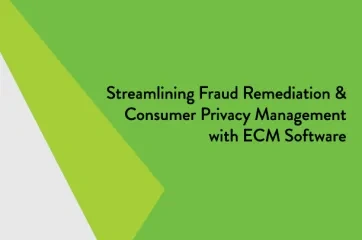Batch scanning is the process of scanning more than one document in a single action. For example, a lender might use batch scanning to quickly digitize an entire loan file for a customer.
With this approach, scanning and indexing are often separated into two distinct activities, making it popular among banks and credit unions with many branches or those seeking a decentralized imaging strategy. Lenders, loan assistants, and front-line staff support the process by scanning in the documentation, while back-office staff pick the file apart and move pages to the correct files.
Batch Scanning vs. Direct Scanning of Documents
Compared to direct scanning, which typically involves scanning and indexing during the same action, batch scanning frees up front-line staff to remain focused on their primary roles while ensuring documentation requirements are still being met. Scanning in a large stack of paper documents—without getting caught up in the minutiae of deciding where individual documents should go—increases efficiency and lessens the chance for indexing inconsistencies.
With batch scanning, a lender at a remote location could scan a large stack of updated financials from multiple account holders. Then, a centralized team of dedicated loan administrators would ensure the documents pass QC and end up in the right place in the bank or credit union’s document management system.
Making Batch Scanning a Reality at Banks and Credit Unions
Achieving a decentralized document management strategy through batch scanning depends heavily on a financial institution’s technology. Implementing a flexible, easy-to-use document management system, such as AccuAccount, aligns with the need to support multiple scanning and imaging processes—including batch scanning.
Simply getting the documents into electronic format is only one part of the equation. To ensure batch scanning success, banks and credit unions need a system that also supports back-office staff who oversee indexing and quality control.
Learn More About Bank and Credit Union Scanning & Indexing
If you would like to learn more about how to decentralize your document scanning processes, check out our scanning and imaging solutions.
Continue reading additional bank terminology.














